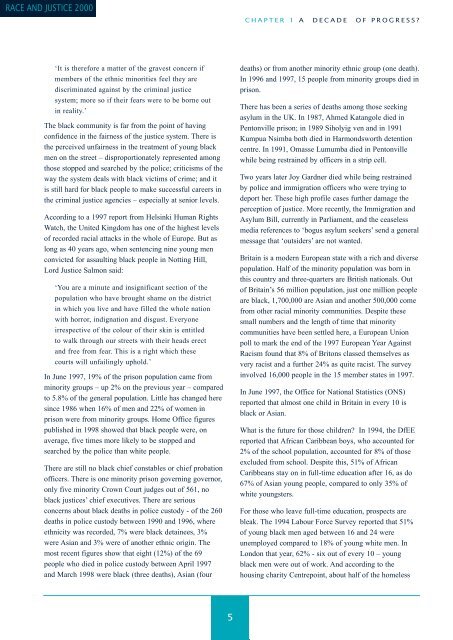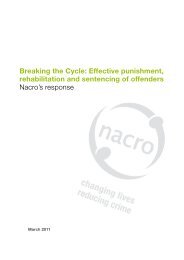Let's get it right: race and justice 2000 - Nacro
Let's get it right: race and justice 2000 - Nacro
Let's get it right: race and justice 2000 - Nacro
- No tags were found...
Create successful ePaper yourself
Turn your PDF publications into a flip-book with our unique Google optimized e-Paper software.
RACE AND JUSTICE <strong>2000</strong>CHAPTER 1 A DECADE OF PROGRESS?‘It is therefore a matter of the gravest concern ifmembers of the ethnic minor<strong>it</strong>ies feel they arediscriminated against by the criminal <strong>justice</strong>system; more so if their fears were to be borne outin real<strong>it</strong>y.’The black commun<strong>it</strong>y is far from the point of havingconfidence in the fairness of the <strong>justice</strong> system. There isthe perceived unfairness in the treatment of young blackmen on the street – disproportionately represented amongthose stopped <strong>and</strong> searched by the police; cr<strong>it</strong>icisms of theway the system deals w<strong>it</strong>h black victims of crime; <strong>and</strong> <strong>it</strong>is still hard for black people to make successful careers inthe criminal <strong>justice</strong> agencies – especially at senior levels.According to a 1997 report from Helsinki Human RightsWatch, the Un<strong>it</strong>ed Kingdom has one of the highest levelsof recorded racial attacks in the whole of Europe. But aslong as 40 years ago, when sentencing nine young menconvicted for assaulting black people in Notting Hill,Lord Justice Salmon said:‘You are a minute <strong>and</strong> insignificant section of thepopulation who have brought shame on the districtin which you live <strong>and</strong> have filled the whole nationw<strong>it</strong>h horror, indignation <strong>and</strong> disgust. Everyoneirrespective of the colour of their skin is ent<strong>it</strong>ledto walk through our streets w<strong>it</strong>h their heads erect<strong>and</strong> free from fear. This is a <strong>right</strong> which thesecourts will unfailingly uphold.’In June 1997, 19% of the prison population came fromminor<strong>it</strong>y groups – up 2% on the previous year – comparedto 5.8% of the general population. L<strong>it</strong>tle has changed heresince 1986 when 16% of men <strong>and</strong> 22% of women inprison were from minor<strong>it</strong>y groups. Home Office figurespublished in 1998 showed that black people were, onaverage, five times more likely to be stopped <strong>and</strong>searched by the police than wh<strong>it</strong>e people.There are still no black chief constables or chief probationofficers. There is one minor<strong>it</strong>y prison governing governor,only five minor<strong>it</strong>y Crown Court judges out of 561, noblack <strong>justice</strong>s’ chief executives. There are seriousconcerns about black deaths in police custody - of the 260deaths in police custody between 1990 <strong>and</strong> 1996, whereethnic<strong>it</strong>y was recorded, 7% were black detainees, 3%were Asian <strong>and</strong> 3% were of another ethnic origin. Themost recent figures show that eight (12%) of the 69people who died in police custody between April 1997<strong>and</strong> March 1998 were black (three deaths), Asian (fourdeaths) or from another minor<strong>it</strong>y ethnic group (one death).In 1996 <strong>and</strong> 1997, 15 people from minor<strong>it</strong>y groups died inprison.There has been a series of deaths among those seekingasylum in the UK. In 1987, Ahmed Katangole died inPentonville prison; in 1989 Siholyig ven <strong>and</strong> in 1991Kumpua Nsimba both died in Harmondsworth detentioncentre. In 1991, Omasse Lumumba died in Pentonvillewhile being restrained by officers in a strip cell.Two years later Joy Gardner died while being restrainedby police <strong>and</strong> immigration officers who were trying todeport her. These high profile cases further damage theperception of <strong>justice</strong>. More recently, the Immigration <strong>and</strong>Asylum Bill, currently in Parliament, <strong>and</strong> the ceaselessmedia references to ‘bogus asylum seekers’ send a generalmessage that ‘outsiders’ are not wanted.Br<strong>it</strong>ain is a modern European state w<strong>it</strong>h a rich <strong>and</strong> diversepopulation. Half of the minor<strong>it</strong>y population was born inthis country <strong>and</strong> three-quarters are Br<strong>it</strong>ish nationals. Outof Br<strong>it</strong>ain’s 56 million population, just one million peopleare black, 1,700,000 are Asian <strong>and</strong> another 500,000 comefrom other racial minor<strong>it</strong>y commun<strong>it</strong>ies. Desp<strong>it</strong>e thesesmall numbers <strong>and</strong> the length of time that minor<strong>it</strong>ycommun<strong>it</strong>ies have been settled here, a European Unionpoll to mark the end of the 1997 European Year AgainstRacism found that 8% of Br<strong>it</strong>ons classed themselves asvery racist <strong>and</strong> a further 24% as qu<strong>it</strong>e racist. The surveyinvolved 16,000 people in the 15 member states in 1997.In June 1997, the Office for National Statistics (ONS)reported that almost one child in Br<strong>it</strong>ain in every 10 isblack or Asian.What is the future for those children? In 1994, the DfEEreported that African Caribbean boys, who accounted for2% of the school population, accounted for 8% of thoseexcluded from school. Desp<strong>it</strong>e this, 51% of AfricanCaribbeans stay on in full-time education after 16, as do67% of Asian young people, compared to only 35% ofwh<strong>it</strong>e youngsters.For those who leave full-time education, prospects arebleak. The 1994 Labour Force Survey reported that 51%of young black men aged between 16 <strong>and</strong> 24 wereunemployed compared to 18% of young wh<strong>it</strong>e men. InLondon that year, 62% - six out of every 10 – youngblack men were out of work. And according to thehousing char<strong>it</strong>y Centrepoint, about half of the homeless5

















